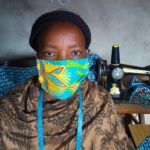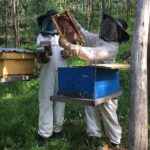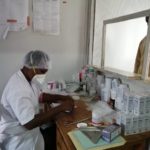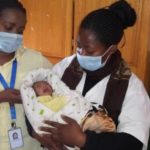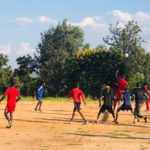Embracing New Possibilities
Our Work
Rwanda
With over two decades of continuous presence in Rwanda, Alight has been playing a critical role in helping displaced people rebuild their lives. Today, Alight Rwanda works in all five refugee camps in the country, serving mostly Congolese and Burundian refugees. In the past, Alight Rwanda has also supported displaced communities in three urban areas and three refugee reception and transit centers.
Alight Rwanda works closely with key stakeholders including the Rwandan Government, U.S Government agencies, and the United Nations (UN) to provide core services. We also work alongside like-minded humanitarians, businesspeople, and institutions to unleash new possibilities. Together, we are channeling Rwanda's abundant energy for change, building on the work we began over twenty years ago and emerging as a leader in innovative approaches.
Read more about Alight Rwanda's programs in our latest post.
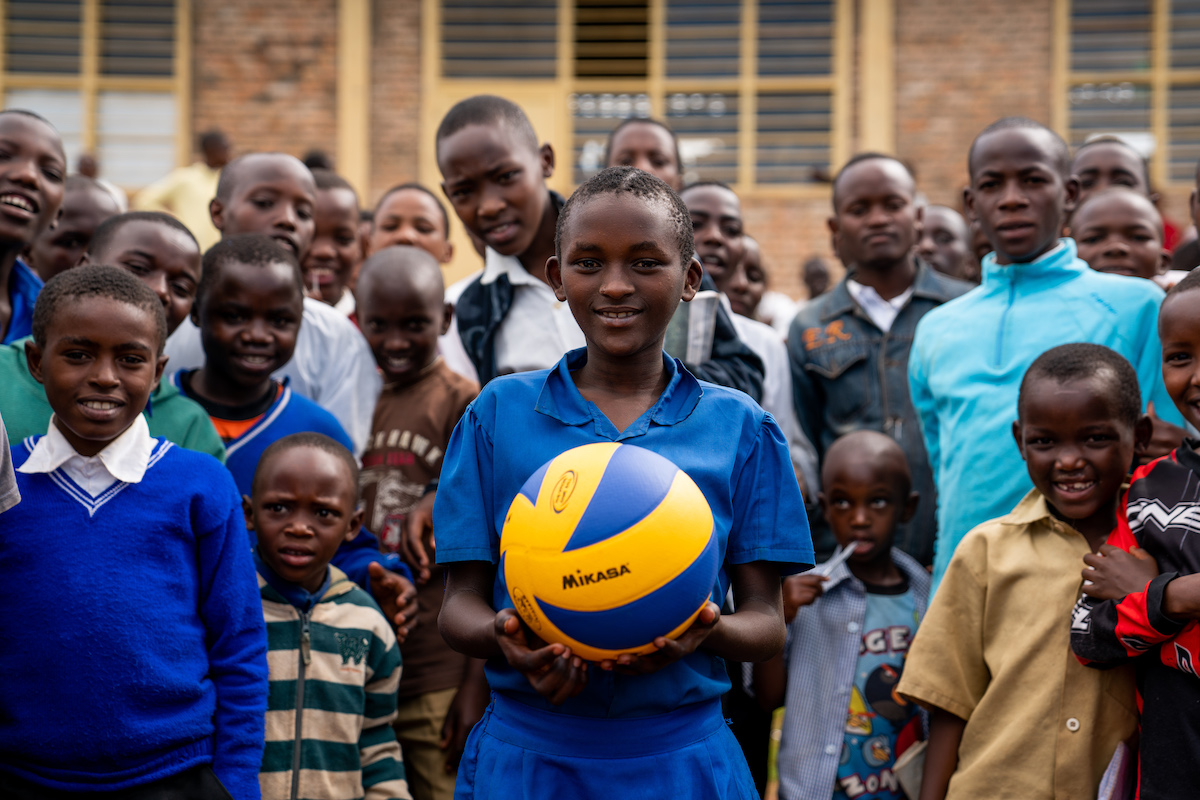
As part of Alight’s Changemakers 365 program, this group of students at Mugombwa Host community school received volleyballs for their school’s team and recess, allowing an outlet to play, grow, and thrive.
Moving Toward the Future
While Alight Rwanda works to ensure that refugees’ basic needs are met, we also recognize that to help displaced people fully regain a life of dignity and fulfillment we must think and act beyond the status quo. This includes seeking out partners in the private sector.
Our partnership with MeshPower seeks to provide safe, reliable, and cost-effective power such as solar streetlights, charging kiosks, and energy saving stoves. Our partnership with VIAMO has provided technologically driven humanitarian assistance such as Interactive Voice Response (IVR) systems for pregnant mothers. Additionally, our partnership with kLab is pioneering world-class coding schools for talented refugees and host community learners.
Alight recognizes the strength in coming together for a common purpose as one of our core values of ‘finding others.’ We are now part of two consortiums: KUHI, which seeks to provide digital access and digital economic empowerment to both host and displaced populations in Rwanda, and the Clean Energy Consortium, which seeks to explore clean and sustainable energy sources for the last mile communities.
The Rwandan Government’s dedication to economic growth, stability, and building world class systems and solutions provides an ideal environment for our experimentation and innovation— including implementing a feedback component of our programs through Kuja Kuja. KujaKuja collects feedback on the quality of the services that Alight offers with the aim of constant improvement and transparency to our customers. In Rwanda, we have collected more than 600,000 ratings of our services and over 200,000 ideas for how to do better. KujaKuja allows us to consistently improve and iterate on all our programs, helping to fulfill our promise to do more—and to never settle.
Comprehensive Health & Nutrition
For over a decade, Alight Rwanda has led the implementation of health and nutrition programs in each camp across the country. With a formidable health team, Alight Rwanda responds to emergencies and provides high quality services. We are currently implementing comprehensive nutrition services in Kiziba, Nyabiheke and Mugombwa camps.
We practice regular monthly nutrition screenings, identifying cases of malnourishment and getting them the support that they need. This is of particular concern for malnourished children, who are immediately treated in our supplementary or therapeutic feeding programs or referred to hospitals for higher levels of treatment. We also take great care to support pregnant and breastfeeding moms, ensuring that they receive supplements like iron, if needed, and that they have the tools required to maintain a healthy pregnancy and birth.
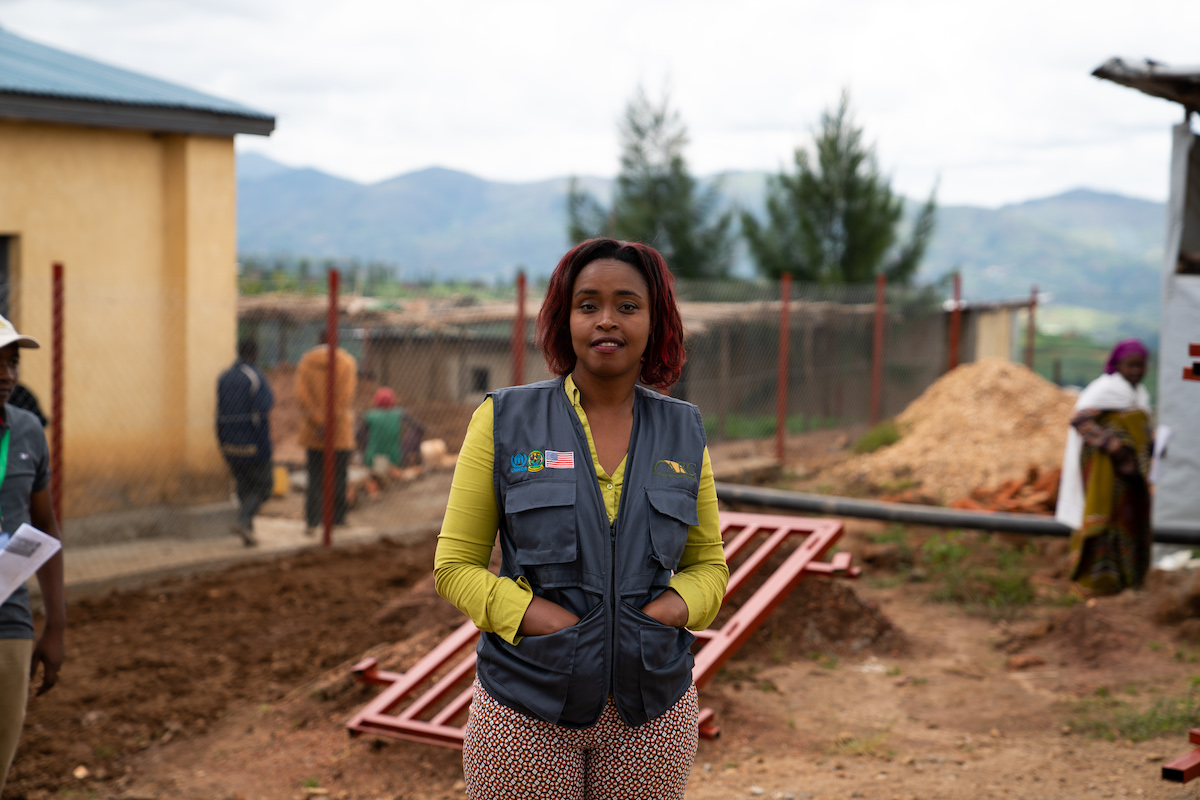
Chantal, Alight Rwanda’s Protection Manager, is pictured standing in front of a women's safe house and counseling space in Kigeme Refugee Camp.
Shelter & Built Environment
Constructing shelters in refugee camps is sometimes thought of as an emergency response. It can be, as was the case for the emergency construction of the Mahama Refugee Camp after an influx of refugees in 2015. But for the Rwanda team, “shelter” also means making a deliberate decision to maintain and improve the built environment in the places we work, whether that be roads, modern hospitals, or repairing dilapidated buildings.
Rwanda’s mountainous landscape can make infrastructure a challenge. But our engineers have worked diligently to construct over 41 kilometers of road (and counting), 38 bridges, over 12,000 permanent shelters for refugee camps, as well as social halls, banks, health facilities, maternity units, dental units, safe houses, nutrition centers, soccer fields, youth centers, and even cinemas! It’s all a part of making refugee camps and host communities not only safe, secure places, but places where people can build a meaningful life, too.
Building Community Economies
Strengthening one’s livelihood—the way someone creates, learns, contributes, and supports themselves and their family—is key to helping people, refugees included, to build a life full of meaning. The Alight Rwanda team knows the power of a thriving, confident livelihood. And through multiple approaches, they do their best to help refugees get there.
The Stepped Approach to Improved Livelihoods program (SAIL) is one way. SAIL is a competitive business grant program designed to empower entrepreneurs through small business grants. Budding refugee and host entrepreneurs also receive training to support their small businesses, which provide services like hairstyling, mobile phone services, shoe repair, masonry, carpentry and transportation.
Through Village Savings and Loans Associations (VSLAs), communities can pool money into a group-managed trust, enabling members to invest in small businesses, school fees, and social events that are crucial for displaced persons to regain a sense of normalcy.
Technical and vocational training is also key. We’ve partnered with several accredited Rwanda academies to provide training in high-demand skills for the local and national labor market, like electronics repair, tailoring, carpentry, masonry, engine repair, and hairstyling.
Safe Water, Sanitation and Hygiene
Getting safe drinking and household water to families is vital to maintaining a healthy, thriving community. Right now, Alight is providing essential water, sanitation infrastructure and hygiene services in three refugee camps in Rwanda—Kiziba, Gihembe, and Nyabiheke. This includes managing the camps’ water supply through boreholes and natural sources, maintaining water infrastructure like showers, taps, pipes, reservoirs, and purifications, as well as regular water testing and quality control.
Sanitation and hygiene go hand in hand with safe water and healthy living. Alight teams ensure that there are clean and safe latrines available for both men and women, manage waste disposal, and build knowledge of best hygiene practices to prevent the spread of diseases.
Under Umuganda (Rwanda’s country-wide community clean-up initiative), the Rwanda team continues to train refugee communities to contribute to the maintenance of the water and sanitation systems. Every month, we work with refugee volunteers to test and purify water sources, monitor water points and latrines, and participate in hygiene promotion campaigns. It’s a group effort!
Protecting Communities & Prevention of SGBV
Life in a refugee camp can present a new level of challenges for already-vulnerable people—especially for women and children. Across all refugee camps and in urban settings in Rwanda, Alight teams actively work to reduce the risk of gender-based violence through a community-led approach, promoting resilience, fostering community activism, and enabling survivors and those at risk to access care and support.
We are heavily invested in GBV (Gender Based Violence) prevention. Alight has provided case management and psychosocial support, caring for those who have experienced trauma such as rape, emotional abuse, physical assault, and sexual assault, including children. By practicing survivor-centered care, Alight focuses on a holistic approach that provides clear, coherent pathways for continuing support and using trained staff to provide the safety, security, and confidentiality they need to survive.
WOMEN ECONOMIC EMPOWERMENT
Alight Rwanda acknowledges and supports the role of women in building local economies. Investing in women’s economic empowerment sets a direct path towards gender equality, poverty eradication, and inclusive economic growth. To this end, we work with women to enhance their economic empowerment by first understanding the barriers and identifying context specific opportunities. We facilitate building financial and digital literacy by addressing social norms and underlying societal barriers to gender equality and supporting women in establishing their own income generating activities as well as beneficial financial practices.
SUPPORTING CHILDREN OUT OF SCHOOL
In Rwanda, most children drop out of school due to a late start, which contributes to feelings of being out of place and a lack of enthusiasm, particularly primary-school-age children. Permanent dropouts tend to happen around the transition from primary to secondary education contrary to the notion that “older children drop out.” Through various interventions, Alight Rwanda seeks to identify and support children in returning to school.
SAFE, CLEAN, AND RELIABLE ENERGY
Alight Rwanda works with stakeholders to provide safe, reliable, and clean energy to communities who are not connected to the national grid. These interventions seek to provide access to opportunities that can only be realized by having a sustainable source of energy, such as schools, businesses, health centers, energy facilitated agriculture, or household access to digital services.
Rwanda: Related Information
Masking the Pandemic
—
Refugee tailors step up the fight against COVID-19
Kiziba is Rwanda’s oldest refugee camp. Situated in Rwanda’s Western Province, it was opened in 1996 after the start of civil war in neighboring DRC spilled over into Rwanda’s borders. The camp is a bit quieter these days, with 17,000 refugees—mostly Congolese—remaining there.
Read MoreA Sweet Idea
—
Building a beekeeping business in Nyabiheke Refugee Camp
“This is something quite special, it’s motivating to people. And we have big dreams for it...I see this growing bigger and bigger.” Read MoreStaying Stocked
—
Doing the doable to get critical medications & supplies to people in need during COVID-19
There’s no denying that COVID-19 means an upheaval for so many industries, and tragedy for so many families. But with any momentous upheaval also comes opportunity for change— lasting change, and that sometimes pushes us toward the future. Read MoreSaving Lives in Gihembe Refugee Camp
—
Healthcare Workers Adjust to the Realities of COVID-19
The spread of COVID-19 challenged the world to change the way things work, and quickly. This was especially true for medical facilities and the health workers who needed to continue their everyday care for people in need, but who were also called to respond to the pandemic. In Rwanda, and for Alight, this also meant a re-think of healthcare systems that serve some of its most vulnerable—refugees living in camps. Read MoreProtecting the Most Vulnerable in Gashora
—
Helping refugees rebound, recover, and build a meaningful life
In 2019, Rwanda welcomed hundreds of asylum seekers, who had previously been living in Libya, to take shelter within its borders. Most of them had been en route to Europe, planning to try their hand at the dangerous sea crossing. They were seeking desperately to start a new life for their families. Read MoreThe changing dynamics of displaced persons demands deeper reflection and a shift to more meaningful engagement of affected populations as principal parties, contributors and shapers of their futures and destiny..
– Bernad Ochieng, Country Director
